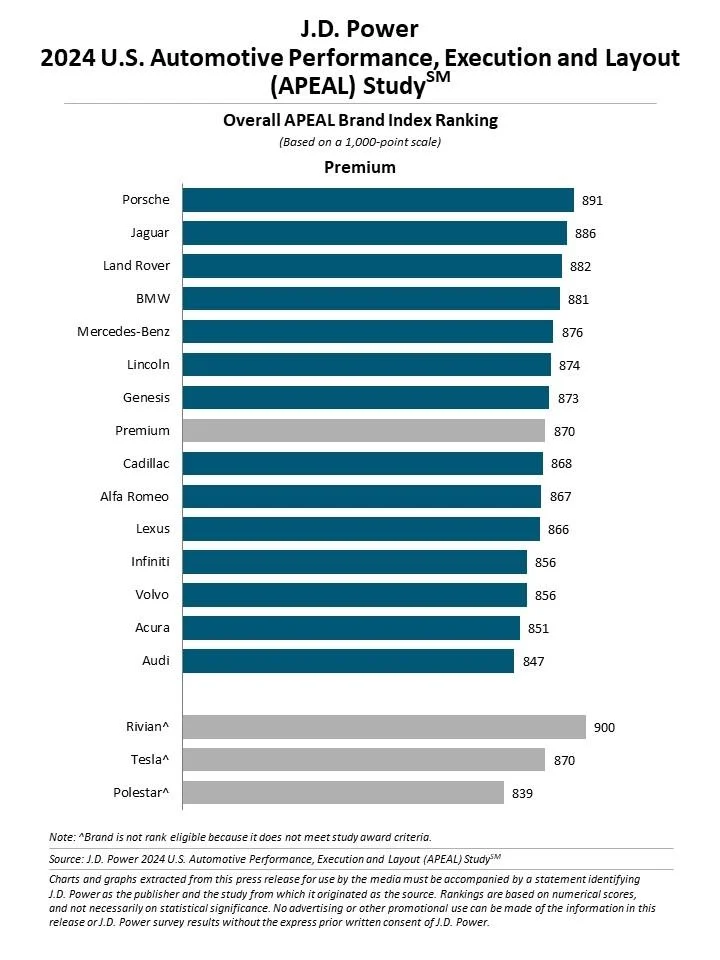
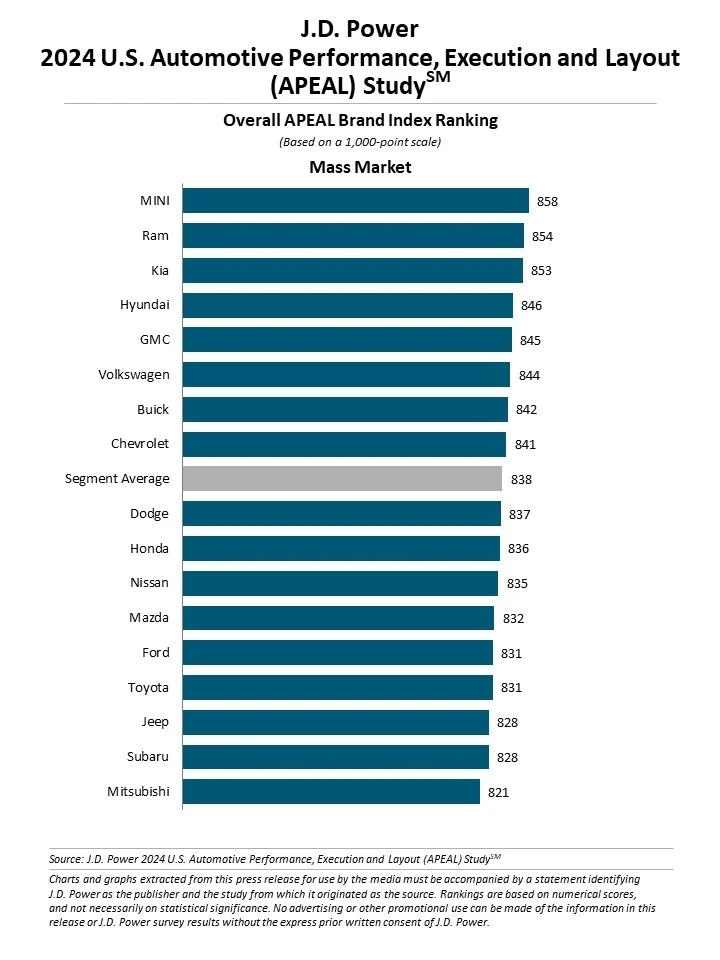
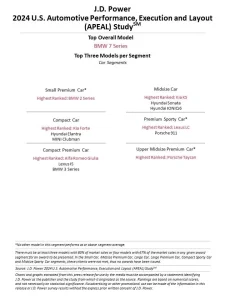
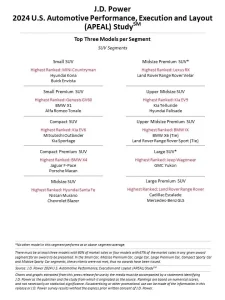
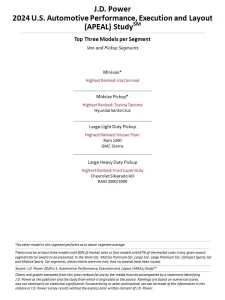 Owner satisfaction with new-vehicle design and performance has rebounded after two years of unprecedented decline, according to the J.D. Power 2024 U.S. Automotive Performance, Execution and Layout (APEAL) Study,SM released today. Overall satisfaction is 847 (on a 1,000-point scale), an increase of 2 points from a year ago. Satisfaction with non-Tesla battery electric vehicles (BEVs) is at an all-time high (877), surpassing stalwart Tesla (870).
Owner satisfaction with new-vehicle design and performance has rebounded after two years of unprecedented decline, according to the J.D. Power 2024 U.S. Automotive Performance, Execution and Layout (APEAL) Study,SM released today. Overall satisfaction is 847 (on a 1,000-point scale), an increase of 2 points from a year ago. Satisfaction with non-Tesla battery electric vehicles (BEVs) is at an all-time high (877), surpassing stalwart Tesla (870).
“Traditional manufacturers have listened to the Voice of the Customer,” said Frank Hanley, senior director of auto benchmarking at J.D. Power. “They’re launching enhanced vehicles that are more in line with what customers want, including improved interior storage and higher quality materials, as well as ensuring features have ease of use. For BEVs, recent launches from traditional manufacturers have surpassed perennial leader Tesla when it comes to owners’ level of emotional attachment and excitement with their new vehicle.”
However, one area that continues to put a damper on excitement across all vehicle fuel types is infotainment—one of the 10 factors on which the study is based. Despite satisfaction improving 5 points this year to 823, infotainment remains one of the lowest-scoring categories industry wide. While satisfaction with in-vehicle infotainment systems averages 805, it is higher among owners who use Android Auto (832) or Apple CarPlay (840). This shows that customers prefer to have the simplistic usability of their phone extended into their vehicle more so than what manufacturers are providing.
Now in its 29th year, the APEAL Study complements the J.D. Power U.S. Initial Quality StudySM (IQS) and the J.D. Power U.S. Tech Experience Index (TXI) StudySM by measuring owners’ emotional attachment and level of excitement with their new vehicle. The APEAL Study asks owners to consider 37 attributes, ranging from the sense of comfort they feel when climbing into the driver’s seat to their exhilaration when they step on the accelerator. Vehicle owners’ responses to queries about these attributes are aggregated to compute an overall APEAL Index score.
Following are key findings of the 2024 study:
- BEVs from traditional manufacturers highly appealing: Across all fuel types, emotional satisfaction is highest among owners of non-Tesla BEVs (877), surpassing Tesla (870), owners of gasoline (842) and plug-in hybrid (841) vehicles. Tesla remains strong for satisfaction among its loyal buyers but is lackluster with conquest buyers. Newer BEVs are achieving higher APEAL scores due to improved battery range and better interior materials.
- Premium brands still stir more emotions than mass market brands: While satisfaction is higher for premium brands than for mass market brands (870 vs. 838, respectively), only mass market brands show year-over-year improvement, on average, rising a single point. The gap was smallest in 2021 when emotional satisfaction among owners of mass market vehicles was only 19 points behind that of premium vehicle owners.
- Infotainment systems are getting more complicated: Gone are the days of only listening to AM or FM radio—owners now switch between a variety of audio sources including satellite radio and Apple CarPlay. However, 25% of owners say switching between sources contributes to a poor audio experience and 23% say difficult menu structure is to blame. “Automakers keep pouring additional features into their vehicle infotainment systems, but it appears to be creating needless complexity,” Hanley said. “Owners struggle to perform simple audio-related tasks, so it begs the question whether automakers are actually in tune with the desires and needs of their customers.”
- High APEAL drives long-term value: Vehicles with a higher APEAL performance retain their value at a greater rate than do those with lower APEAL performance. The Net Promotor Score®1 is 38 points higher when APEAL is above average, meaning owners are more likely to promote their vehicle and recommend it to friends and family, further illustrating the long-term effect that a highly appealing vehicle has on the marketplace.
Highest-Ranking Brands
Porsche ranks highest among premium brands with a score of 891. Jaguar (886) ranks second and Land Rover (882) ranks third.
MINI ranks highest among mass market brands with a score of 858. Ram (854) ranks second and Kia (853) ranks third.
Model-Level APEAL Awards
The parent company receiving the most model-level awards (for models ranking highest in their respective segment) is Hyundai Motor Group (seven segment awards), followed by BMW AG (four segment awards and highest-ranking model) and Toyota Motor Corporation (three segment awards).
The complete list of award recipients is:
Hyundai Motor Group: Genesis GV60, Hyundai Santa Fe, Kia Carnival, Kia EV6, Kia EV9, Kia Forte and Kia K5
BMW AG: BMW 2 Series, BMW 7 Series, BMW iX, BMW X4 and MINI Countryman
Toyota Motor Corporation: Lexus LC, Lexus RX and Toyota Tacoma
Stellantis NV: Alfa Romeo Giulia and Jeep Wagoneer
Nissan Motor Co., Ltd: Nissan Titan
Volkswagen AG: Porsche Taycan
Jaguar Land Rover Limited: Land Rover Range Rover
Ford Motor Company: Ford Super Duty
BMW 7 Series is the highest-ranking individual model. Kia K5 receives a model-level award for a fourth consecutive year, while Kia EV6 and Kia Carnival each receive model-level awards for a third consecutive year. BMW iX, BMW X4, Genesis GV60, Kia Forte, MINI Countryman, Nissan Titan, Lexus RX and Land Rover Range Rover each receive model-level awards for a second consecutive year.
See the rank charts and list of model-level award winners at http://www.jdpower.com/pr-id/2024072.
The 2024 U.S. APEAL Study is based on responses from 99,144 owners of new 2024 model-year vehicles who were surveyed after 90 days of ownership. The study was fielded from July 2023 through May 2024 based on vehicles registered from April 2023 through February 2024.
For more information about the U.S. APEAL Study, visit https://www.jdpower.com/business/us-automotive-performance-execution-and-layout-apeal-study